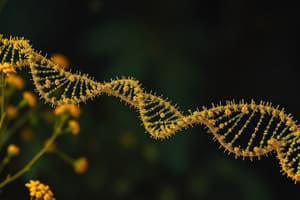Podcast
Questions and Answers
What is the process of creating genetically identical copies of an organism?
What is the process of creating genetically identical copies of an organism?
- Gene editing
- Protein engineering
- Cloning (correct)
- DNA sequencing
Which technique involves the replication of a specific DNA sequence in a host organism, such as bacteria?
Which technique involves the replication of a specific DNA sequence in a host organism, such as bacteria?
- RNA splicing
- Protein synthesis
- Cell differentiation
- DNA cloning (correct)
What is one of the applications of gene editing mentioned in the text?
What is one of the applications of gene editing mentioned in the text?
- Developing new antibiotics
- Creating disease-resistant crops (correct)
- Studying animal behavior
- Producing disease-causing mutations
Which technology is being investigated for treating diseases and creating genetically modified crops?
Which technology is being investigated for treating diseases and creating genetically modified crops?
What does DNA cloning enable according to the text?
What does DNA cloning enable according to the text?
Study Notes
Biotechniques: Exploring DNA Sequencing, Gene Editing, and Cloning
Biotechnology is a dynamic field that employs biological systems to create new technologies, products, and solutions to enhance our lives. In this article, we will focus on three essential techniques in biotechnology: DNA sequencing, gene editing, and cloning, exploring their applications and current advancements.
DNA Sequencing
DNA sequencing is the process of determining the order of nucleotides in a DNA molecule. Next-generation sequencing (NGS) technologies have revolutionized the field, enabling faster, cheaper, and more accurate analysis than earlier methods such as Sanger sequencing.
- NGS: This method generates millions of short DNA sequences concurrently, accelerating research and reducing costs.
- Applications: DNA sequencing aids in the discovery of new genes, identification of genetic variations linked to diseases, and monitoring the spread of pathogens.
Gene Editing
Gene editing refers to the direct manipulation of an organism's genome using precise molecular tools. The two most widely used gene-editing technologies are CRISPR-Cas9 and TALENs.
- CRISPR-Cas9: This method employs the Cas9 enzyme and a guide RNA to target and cut DNA at specific sites, enabling the insertion or removal of genetic material.
- TALENs: Transcription activator-like effector nucleases utilize modified proteins from bacteria to cleave DNA at specific sites.
- Applications: Gene editing can correct disease-causing mutations, develop disease-resistant crops, and create model organisms for research.
Cloning
Cloning is the process of creating genetically identical copies of an organism.
- DNA cloning: This technique involves the replication of a specific DNA sequence in a host organism, such as bacteria.
- Applications: DNA cloning enables the large-scale production of specific proteins, the creation of transgenic organisms, and the study of gene function.
Current Advances
- Efficient gene editing in embryos: PEmbryo, a new tool, simplifies the CRISPR-Cas9 process for editing mouse embryos, promising more efficient gene editing.
- Machine learning for protein design: Protein language models can predict the structure and function of proteins, aiding protein engineering.
- Real-world applications: Gene editing technologies are being investigated for treating diseases and creating genetically modified crops.
Biotechnology continues to evolve at an unprecedented rate, shaping our future and improving our lives. As we harness the power of DNA sequencing, gene editing, and cloning, our understanding of biology and the possibilities for innovation grow ever more expansive.
Studying That Suits You
Use AI to generate personalized quizzes and flashcards to suit your learning preferences.
Description
Test your knowledge on DNA sequencing, gene editing techniques like CRISPR-Cas9, TALENs, and the process of cloning in biotechnology. Explore applications and recent advancements in the field.




